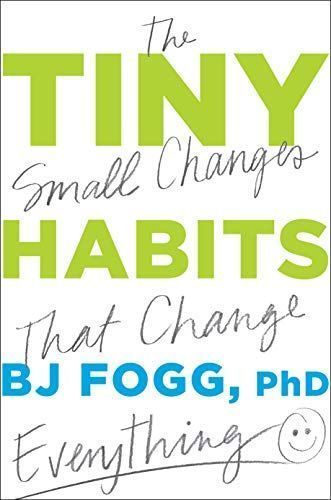
Tiny Habits The Small Changes That Change Everything
The world's leading expert on habit formation shows how you can have a happier, healthier life: by starting small. Myth: Change is hard. Reality: Change can be easy if you know the simple steps of Behavior Design. Myth: It's all about willpower. Reality: Willpower is fickle and finite, and exactly the wrong way to create habits. Myth: You have to make a plan and stick to it. Reality: You transform your life by starting small and being flexible. BJ FOGG is here to change your life--and revolutionize how we think about human behavior. Based on twenty years of research and Fogg's experience coaching more than 40,000 people, Tiny Habits cracks the code of habit formation. With breakthrough discoveries in every chapter, you'll learn the simplest proven ways to transform your life. Fogg shows you how to feel good about your successes instead of bad about your failures. Already the habit guru to companies around the world, Fogg brings his proven method to a global audience for the first time. Whether you want to lose weight, de-stress, sleep better, or be more productive each day, Tiny Habits makes it easy to achieve.
Reviews
Frank Enns@runefaust
Stefan Pettersson@stpe
Yunna Ducharme@yuducharme
Mahogany Skillings@bibliogeekgirl
Volkan Yorulmaz@volkanyorulmaz
Ruby Huber@rubyread
Pam Sartain@certainlygeeky
terka_telka@teresinka55
Sugar Perez Alcain@sugiedoo
Viktor@dviktor07
Christian Bager Bach Houmann@cbbh
Jannis M@jmm
Nick Gracilla@ngracilla
Ana Ferreira@ana
Erik Horton@erikhorton
395-M@395-m
Dave Walker@bibliosaurusrex
Kevin Spachuk@spacious1
Ostap Gorin@gorya
Xavier Roy@xavierroy
Heather Overstreet @Hlhayes7
Joshua Line@fictionjunky
Alberto Cabas Vidani@albertocv
Dustin Wyse-Fisher@dwysefisher
Highlights
Sugar Perez Alcain@sugiedoo
Page 267
Sugar Perez Alcain@sugiedoo
Page 258
Sugar Perez Alcain@sugiedoo
Sugar Perez Alcain@sugiedoo
Page 225
Sugar Perez Alcain@sugiedoo
Page 224
Sugar Perez Alcain@sugiedoo
Page 206
Sugar Perez Alcain@sugiedoo
Page 169
Sugar Perez Alcain@sugiedoo
Sugar Perez Alcain@sugiedoo
Sugar Perez Alcain@sugiedoo
Sugar Perez Alcain@sugiedoo
Sugar Perez Alcain@sugiedoo
Sugar Perez Alcain@sugiedoo
Sugar Perez Alcain@sugiedoo
valeneayar@Valene